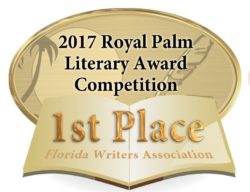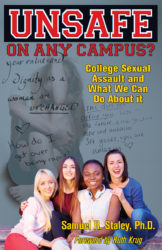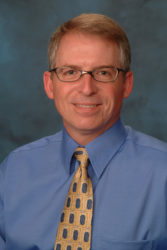
Published – Educational
At the 2017 Royal Palm Literary Award Banquet, author Samuel Staley won First Place for his published educational book, Unsafe on Any Campus. Each year at the RPLA Banquet, authors experience the joy of earning accolades for all the hard work that is often done in the privacy of the home with little to no recognition. We’re showcasing the best of the best with our First Place winners spotlight. Not only does RPLA recognize extraordinary talent, but we’re giving readers an opportunity to sample excerpts from the winning stories.

Unsafe on Any Campus?
.This unsparing look at the complex problem of campus sexual assault shows why our children are at risk, why conventional approaches won’t work, and what parents and administrators can do about it.

Samuel R. Staley
Samuel R. Staley, Ph.D., is on the full-time faculty of Florida State University and has a black belt in the self-defense martial art of To-Shin Do ninjutsu.
Interview with Samuel R. Staley, Ph.D.
Q: Where do you get your ideas?
A: Unfortunately, the idea for Unsafe On Any Campus? came from the personal stories of college students. Some of them were survivors of college sexual assault and rape. I was in an unusual circumstance when I moved to Tallahassee in 2011 to take my faculty position at Florida State University. I was living alone, supporting two households (one in Ohio, on in Florida), with two kids about to go into college. So I had a lot of extra time, and not a lot of extra money. I invested my time in volunteer work in the community and began a series of self-defense classes rooted in the martial art I study (To-Shin Do, a form of ninjutsu). Through my volunteer work, I became friends with Ruth Krug. Ruther, I discovered, transferred to Florida State after surviving a rape a college in the Midwest. (Ruth wrote the Foreword to Unsafe On Any Campus?) Then as I got to know my self-defense students, I learned of more women who were sexually assaulted or raped. I began to fully understand that college sexual assault was a much bigger, much more complex problem than many people thought, and that the human trauma was far greater than anyone realized.
Q: Anything in particular about your award-winning RPLA entry that you’d like to share?
A: I think Unsafe On Any Campus? College Sexual Assault and What We Can Do About It fills a unique role in the area of college sexual assault awareness and prevention. I am careful to focus on the college cohort–18 to 24 year olds–and my intent is to be a primer for parents of teenagers and college age students. I take a balanced approach, without demonizing different groups–this is an extraordinarily complex problem and requires understanding all sides to craft an effective solution. College environments are complicated social situations that make men and women more vulnerable to sexual assault. I walk readers through why this is the case, and why the solutions aren’t as easy to identify as many people might think. While the book is not intended to be read by college students, they will definitely benefit from it. Survivors have also told me that the way I explain the emotional and human trauma associated with sexual assault helped “connect the dots” in ways that have enabled some of them to move forward. This was not an intent of the book, but I felt telling an authentic story of the human trauma connected to what we know about human psychology and teenage behavior was critical to understanding the solution. That meant honoring the experiences of the survivors. Based on feedback from readers, I think the book does this.
Q: Who do you credit with inspiring your writing?
A: For this book, the survivors, named and unnamed, are the sole inspiration. This book was a personal and professional risk, and I would not have even considered it (even though I had already written nine books at the time) without feeling a calling to write it based on their willingness to be vulnerable with me. The trigger for writing the book came when I witnessed over a two-week period an anonymous conversation unfold in indelible marker on the back of a bathroom stall door responding to a simple but poignant question: “How do I get over being raped?” This conversation reflected 18 to 20 women responding in incredibly inspirational and supportive ways to the question. I thought: “If this is where college women need to go to get support, advice, and counsel on dealing with this kind of a human tragedy, we have a serious problem.” That’s when I felt the call. This conversation became the anchor for the book’s cover design. The full story has been written up in a blog post titled “College Rape and the Power of Words on a Bathroom Door,”
http://blog.srstaley.com/college-rape-and-the-power-of-words-on-a-bathroom-door/Q: Any tips for new writers?
A: This is a tough question because of I have diverse writing interests. I have now written six published novels (two more waiting in the now proverbial desk drawer), seven nonfiction books, and hundreds of other articles and reports. If we are focused on the creative space, which is where my book-length writing tends to be, I think my most important advice is to find a core inspiration for your work. Even technical books and articles are telling a story. What is the story you want to tell? What is its essence? Use that essence for the inspiration for putting pen to page. In Unsafe On Any Campus?, the essence of what I wanted to do was end the trauma and tragedy of campus sexual assault. To do this, I had to explain the human harm and consequences, the dimension of the problem, and lay out concrete steps for solving the problem. Everything flowed from that essence contained in the human trauma experienced by survivors of rape as told to me by survivors and reflected in that conversation on the back of the bathroom stall door referred to earlier. I think finding the essence of your story is a pretty universal principle of writing, and I practice it in all my books and articles.
A message about supporting literacy in Florida:
If every member of FWA went to Smile.Amazon.com, chose Florida Writers Foundation, Inc. as their charity and, instead of logging into Amazon.com, logged into Smile.Amazon.com, FWF would receive 0.5% of the purchase funds. Every time.
We could significantly fund the literacy efforts of our organization. No money out of your pockets…just some invested time to set this up.
How easy for us to make a difference. To see all of our work, please read the pages of our website www.floridawritersfoundation.com. You’ll be proud.
Melody Dean Dimick,
President, FWF
Share this post with your friends:
Like this:
Like Loading...
Related




Barbara Fifield
Book is well done.